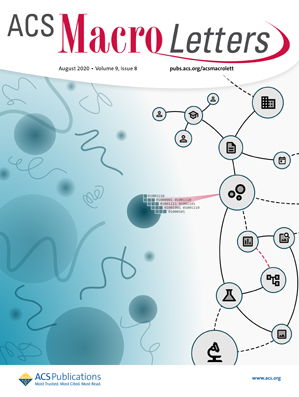Rapid Gelation of Dicyclopentadiene Resins for Additive Manufacturing of Thermoset Polymers
IF 5.1
Q1 POLYMER SCIENCE
引用次数: 0
Abstract
Thermoset resins of dicyclopentadiene were viscosity-modified to achieve the rheology necessary for Direct Ink Writing, with the deposited ink solidified on-the-fly by frontal polymerization. This rapid modification strategy incorporated the ruthenium-based Grubbs’ third-generation catalyst and a ligand exchange reaction to decrease the gelation time for resins to under 10 min, an order of magnitude less than existing strategies. The gelled resins are rheologically stable and retain their reactivity for over 500 days. Viscosity modification enables 3D-printing of these resins, producing polymers with thermomechanical properties that match or surpass those from resins gelled more slowly. Replacing the solvent eliminates reduction in glass transition temperature from plasticization while maintaining extended resin pot life.

用于热固性聚合物添加制造的双环戊二烯树脂快速凝胶化
对双环戊二烯热固性树脂进行了粘度改性,以获得直接油墨书写所需的流变性,并通过正面聚合使沉积的油墨瞬间凝固。这种快速改性策略采用了基于钌的格拉布斯第三代催化剂和配体交换反应,将树脂的凝胶化时间缩短到 10 分钟以下,比现有策略缩短了一个数量级。凝胶树脂流变稳定,反应活性可保持 500 天以上。粘度改性可实现这些树脂的三维打印,生产出的聚合物的热机械性能可媲美或超过凝胶化速度较慢的树脂。取代溶剂可消除塑化造成的玻璃化转变温度降低,同时延长树脂的罐装寿命。
本文章由计算机程序翻译,如有差异,请以英文原文为准。
求助全文
约1分钟内获得全文
求助全文
来源期刊
CiteScore
10.40
自引率
3.40%
发文量
209
审稿时长
1 months
期刊介绍:
ACS Macro Letters publishes research in all areas of contemporary soft matter science in which macromolecules play a key role, including nanotechnology, self-assembly, supramolecular chemistry, biomaterials, energy generation and storage, and renewable/sustainable materials. Submissions to ACS Macro Letters should justify clearly the rapid disclosure of the key elements of the study. The scope of the journal includes high-impact research of broad interest in all areas of polymer science and engineering, including cross-disciplinary research that interfaces with polymer science.
With the launch of ACS Macro Letters, all Communications that were formerly published in Macromolecules and Biomacromolecules will be published as Letters in ACS Macro Letters.

 求助内容:
求助内容: 应助结果提醒方式:
应助结果提醒方式:


